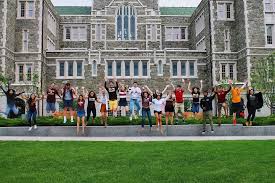Questions? Call: +97714521724
Questions? Call: +97714521724
The students application will be forwarded to the admission committee as soon as the university receives all necessary documents. This process enables candidates to receive an admission decision within a reasonable amount of time after submitting an application. The decision typically arrives about two months after the application process is complete. Receiving a quick decision allows the student to plan his or visa interview well in advance.
If the university does not have rolling admission, they usually have a specific deadline, and no applications are evaluated before this deadline, no matter how early they receive the application documents. All admission decision letters are then mailed to candidates on the same day, which is generally in late March or early April. Usually the deadline dates will be earlier than the universities who have rolling admission.
Application evaluation and admission decisions are made based on several factors. Each university follows their own set of rules for considering the applications. In general, a students academic performance and test scores play major roles in the admission decisions. A history of good academic performance is more important than very high-test scores, just as individual section scores are more important total test scores. Many universities expect a minimum score in each section of the students test results.
Excellent undergraduate performance – especially in the Major courses – is necessary for admission into a Masters degree program. For example, if a student is applying for an engineering program, he or she should have high grades in the areas of math and science. If there are too many applications with a similar set of scores, then the university considers all other aspects of an individuals application, such as extra-curricular activities, or published papers.
Admission records are very confidential and can be obtained only by the student or student-authorized person. The student must provide written consent for any third party, other than University staff, to access his or her educational record.
There are two types of Bachelors degrees – Bachelor of Arts (BA) and Bachelor of Science (BS) – both of which take typically four years to complete. International students on F1 visa status cannot study part-time and must maintain full-time status. If the student in already in the U.S. on a different visa, then he or she may be eligible to do part-time studies, which may take more than four years to complete. One of the most attractive features of the Bachelors degree program is that it is highly flexible. Students can usually choose from a wide variety of courses and create their own unique program of study. The degree is awarded after the student completes a specified number of credits – usually 120 – over a typical period of four years. The first year is called the freshman year, the second is the sophomore, the third is the junior, and the fourth is the senior. In their senior year, students write a thesis for their chosen Major.
